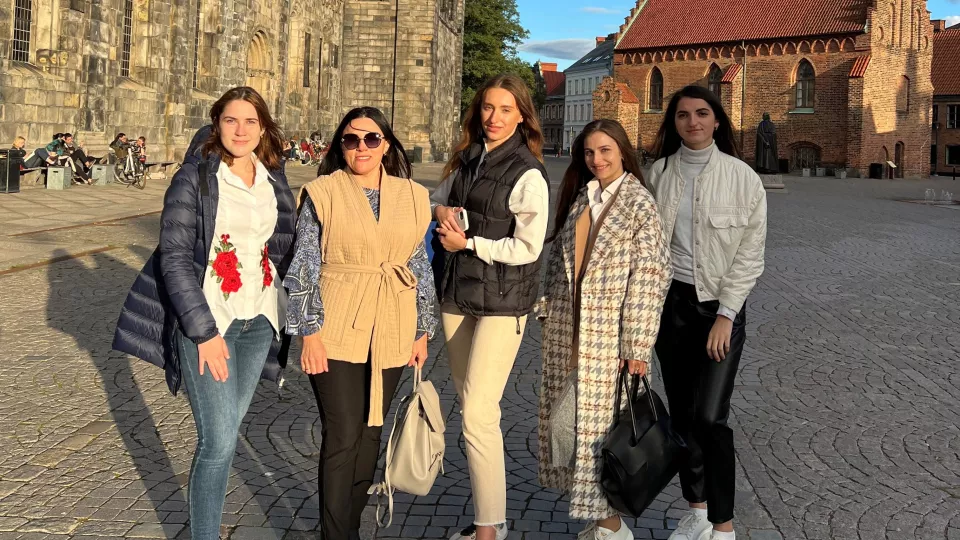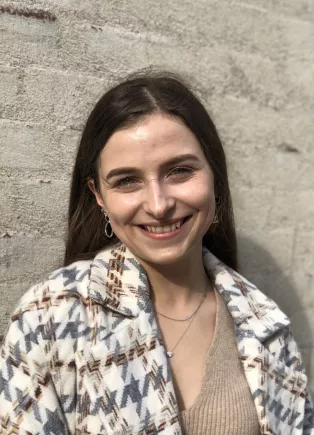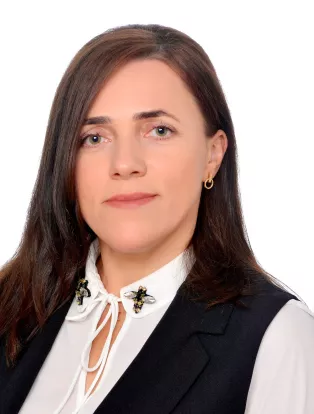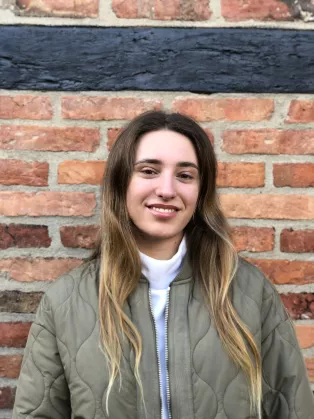“It’s a fantastic opportunity, with such practical studies. The other week I got to stitch up a Cesarean!” says 22-year-old Viktoriia Bedei. She has already completed five out of six years of medical school at Ivano-Frankivsk National Medical University in western Ukraine. Now she and the other three students who came here together in August have days packed with practical training in gynaecology and obstetrics/maternity care. Of course, they have delved into this subject in the course of their education in their home country, but not with nearly as many practical elements as here, says Viktoriia Bedei during a lunch break.
The pandemic has also meant three years of online classes. Immediately after the interview, Viktoriia will head to the hospital, to the urgent gynaecological care ward, or to “gynakuten” as she puts it, laughing a little at her own use of the Swedish word. She is studying Swedish in parallel with the course.
“But I can’t use much of the Swedish yet. The other day there was an elderly female patient who asked if it was hard to not understand people. I said it’s alright, my supervisor explains everything afterwards. But then she said she could speak English instead, so I would understand. And she was 72 or 82 years old. And I was just, like – ‘wow!’.”
Only one day to apply
Viktoriia and the other three exchange students from the Ivano-Frankivsk medical school are among the top students at their university. To be admitted to Lund, they also had to speak English – and to want to come here, of course. On the last weekend in May, Oksana Tymoshchuk travelled to Ivano-Frankivsk for a lightning-fast recruitment process. Lund University’s deadline for submitting applications was 1 June.
“For me, it was really important, if possible, to help students from my home university to come here. After the invasion on 24 February, I decided to travel to Sweden after reading a post on Facebook. A casual acquaintance of mine who had contacts at Lund University asked if anyone from our university might want to go there. So my two kids and I quickly packed and set off for Sweden. In many ways, it’s very hard being in an unfamiliar country. But at the same time, it’s great to be able to be here,” says Oksana Tymoshchuk, who has been granted a year-long internship in Angela Cenci Nilsson’s research group.
At home in Ivano-Frankivsk, she mainly conducts research on medical aspects of students’ quality of life.
On the last day of May, there was a slew of application documents to compile for the four selected medical students.
“We ran around arranging all the papers in one day, the very last day we had to apply. It was super intense, but also interesting,” says Viktoriia Bedei.
The process normally takes a year
Teresa Svarvell, acting Head of the Faculty of Medicine’s International Office, says that the students’ admission process is unusual in several ways. Firstly, what normally takes around a year took only a month – from the day Oksana contacted her until the reception of the students’ complete applications.
“This was only possible to pull of because a comprehensive agreement had given Lund University the go-ahead to accept students on scholarships just a few months earlier.
In this context, four students is a lot. But with the help of the former Programme Coordinator for the Medical Programme, Peter J Svensson, and the Master’s Programmes Board Chairman Thomas Hellmark, we managed to come to a working arrangement,” says Teresa Svarvell.
She also mentions Christer Borgfeldt, Course Coordinator for the Obstetrics and Gynaecology course, as an important piece of the puzzle. This English-language course was already designed specifically for exchange students, and fortunately it was possible to quickly enrol four more students.
Viktoriia Bedei says that she and her three Ukrainian peers also have an academic coordinator and a clinical coordinator, who ensure that both their theoretical and practical studies go smoothly. When the current course is over at the end of November, the students will transition to full-time clinical activities. Peter Svensson points out that the two people/clinics at Skåne University Hospital who have received the four students at such short notice deserve a big thank you: Elena Holm (Haematology) and Fredrik von Wovern (Rheumatology, Endocrinology and Renal Medicine).
On this particular day, Dariia Hrynevych, also 22 and in her sixth year as a medical student, is a little anxious about studying for a Swedish test while also being well-prepared for a seminar in Gynaecology. Even before the war, she was eager to study in a Scandinavian country.
New clinical interests
“Perhaps Sweden will be ‘my’ Scandinavian country. I’m totally in love with Sweden.”
She, too, describes all the clinical practice as the very best thing about studying here. She has also gotten to stitch up a C-section – something she previously did not think she would ever do. She envisioned a more therapeutic approach to her medical career, but now she is very interested in gynaecology.
“I was so proud when I had stitched the incision together. That I could do it, and that the obstetrician said I had done a good job. I called my parents and told them, and they were just as proud as I was.”
The students don’t know what will happen after the semester ends in mid-January. They hope, and choose to believe, that by then it will then be possible to return home to Ukraine and continue their lives there. But if the violence there continues, at least one of them – Dariia Hrynevych – wants to stay longer in Sweden, if possible.
“When I last talked to my mother, she said she’s so happy that at least one of her children is in a safe place. She told me, ‘Don’t worry about us right now, we’ll be okay,’” says Dariia.



